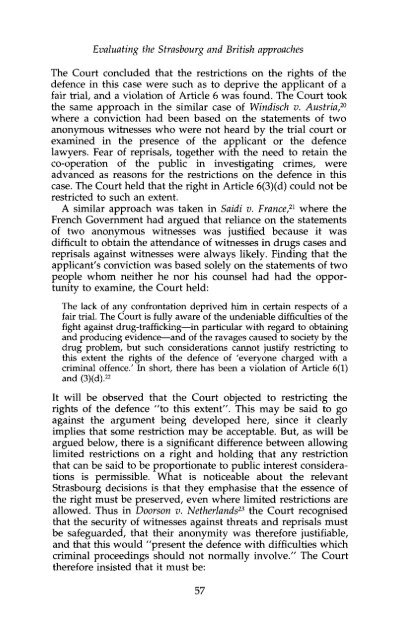Human Rights, Serious Crime and Criminal Procedure - College of ...
Human Rights, Serious Crime and Criminal Procedure - College of ...
Human Rights, Serious Crime and Criminal Procedure - College of ...
- No tags were found...
Create successful ePaper yourself
Turn your PDF publications into a flip-book with our unique Google optimized e-Paper software.
Evaluating the Strasbourg <strong>and</strong> British approachesThe Court concluded that the restrictions on the rights <strong>of</strong> thedefence in this case were such as to deprive the applicant <strong>of</strong> afair trial, <strong>and</strong> a violation <strong>of</strong> Article 6 was found. The Court tookthe same approach in the similar case <strong>of</strong> Windisch v. Austria, 20where a conviction had been based on the statements <strong>of</strong> twoanonymous witnesses who were not heard by the trial court orexamined in the presence <strong>of</strong> the applicant or the defencelawyers. Fear <strong>of</strong> reprisals, together with the need to retain theco-operation <strong>of</strong> the public in investigating crimes, wereadvanced as reasons for the restrictions on the defence in thiscase. The Court held that the right in Article 6(3)(d) could not berestricted to such an extent.A similar approach was taken in Saidi v. France, 21 where theFrench Government had argued that reliance on the statements<strong>of</strong> two anonymous witnesses was justified because it wasdifficult to obtain the attendance <strong>of</strong> witnesses in drugs cases <strong>and</strong>reprisals against witnesses were always likely. Finding that theapplicant's conviction was based solely on the statements <strong>of</strong> twopeople whom neither he nor his counsel had had the opportunityto examine, the Court held:The lack <strong>of</strong> any confrontation deprived him in certain respects <strong>of</strong> afair trial. The Court is fully aware <strong>of</strong> the undeniable difficulties <strong>of</strong> thefight against drug-trafficking—in particular with regard to obtaining<strong>and</strong> producing evidence—<strong>and</strong> <strong>of</strong> the ravages caused to society by thedrug problem, but such considerations cannot justify restricting tothis extent the rights <strong>of</strong> the defence <strong>of</strong> 'everyone charged with acriminal <strong>of</strong>fence.' In short, there has been a violation <strong>of</strong> Article 6(1)<strong>and</strong> (3)(d). 22It will be observed that the Court objected to restricting therights <strong>of</strong> the defence "to this extent". This may be said to goagainst the argument being developed here, since it clearlyimplies that some restriction may be acceptable. But, as will beargued below, there is a significant difference between allowinglimited restrictions on a right <strong>and</strong> holding that any restrictionthat can be said to be proportionate to public interest considerationsis permissible. What is noticeable about the relevantStrasbourg decisions is that they emphasise that the essence <strong>of</strong>the right must be preserved, even where limited restrictions areallowed. Thus in Doorson v. Netherl<strong>and</strong>s 23 the Court recognisedthat the security <strong>of</strong> witnesses against threats <strong>and</strong> reprisals mustbe safeguarded, that their anonymity was therefore justifiable,<strong>and</strong> that this would "present the defence with difficulties whichcriminal proceedings should not normally involve." The Courttherefore insisted that it must be:57
















